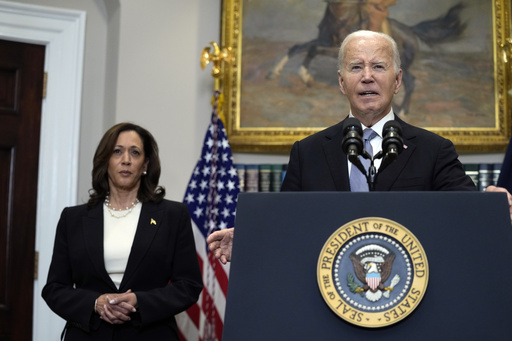ATLANTA (AP) — With President Joe Biden ending his reelection bid and endorsing Vice President Kamala Harris, Democrats now must navigate a shift that is unprecedented this late in an election year.
Democrats are set to hold their convention in Chicago on Aug. 19-22. What was supposed to be a coronation for Biden now becomes an open contest in which nearly 4,700 delegates will be responsible for picking a new standard-bearer to challenge Republican Donald Trump in the fall.
The path ahead is neither easy nor obvious, even with Biden endorsing Harris. There are unanswered questions about logistics, money and political fallout.
Can Biden redirect his delegates?
Biden won every state primary and caucus earlier this year and only lost the territory of American Samoa. At least 3,896 delegates had been pledged to support him.
Current party rules do not permit Biden to pass them to another candidate. Politically, though, his endorsement is likely to be influential.
What could happen at the convention?
With Biden stepping aside, Democrats technically start with an open convention. But realistically, his endorsement pushes Democrats into murky territory.
The immediate burden is on Harris to solidify support across almost 4,000 delegates from the states, territories and District of Columbia, plus more than 700 so-called superdelegates that include party leaders, certain elected officials and former presidents and vice presidents.
Will anyone challenge Harris?
Even before Biden announced his decision, Democrats floated California Gov. Gavin Newsom and Michigan Gov. Gretchen Whitmer as potential contenders in addition to Harris. Yet some Democrats argued publicly, and many privately, that it would be a no-brainer to elevate the first woman, first Black woman and first person of south Asian descent to hold national office.
Given how important Black voters -– and Black women especially -– were to Biden’s nomination and his choice of Harris as running mate, it would be risky, to say the least, for Democrats to pass her over for a white nominee. Democrats already faced historical headwinds before Biden’s withdrawal. Newsom and Whitmer, both of whom are white, and any other Democrat would also have to weigh the short-term and long-term benefits of challenging Harris now versus preserving goodwill for a future presidential primary.
Yet, fair or not, Harris also has not been viewed as an especially beloved or empowered vice president. The best scenario for her and Democrats is to quickly shore up support and project a united front. Democrats could even go forward with their plans for an early virtual vote – a move they’d planned to make sure Biden was selected ahead of Ohio’s general election ballot deadline.
What happens to Biden’s campaign money?
Biden’s campaign recently reported $91 million cash on hand. Allied Democratic campaign committees brought the total at his disposal to more than $240 million. Campaign finance experts agree generally that Harris could control all those funds since the campaign was set up in her name as well as Biden’s. If Democrats do nominate someone other than Harris, party accounts could still benefit the nominee, but the Biden-Harris account would have more restrictions. For example, legal experts say it could become an independent expenditure political action committee but not simply transfer its balance to a different nominee.
How will a vice presidential nomination work?
The vice presidential nomination is always a separate convention vote. In routine years, the convention ratifies the choice of the nominee. If Harris closes ranks quickly, she could name her choice and have the delegates ratify it. In an extended fight, though, the vice presidency could become part of horse-trading — again, a return to conventions of an earlier era.
Can Republicans keep Harris off state ballots?
Any curveball during a U.S. presidential campaign is certain to produce a flurry of state and federal lawsuits in this hyper-partisan era, and some conservatives have threatened just that.
State laws, though, typically do not prescribe how parties choose their nominees for president. And some GOP figures – Ohio Gov. Mike DeWine and Alabama Gov. Kay Ivey – have worked already this year to ensure their party did not deny Democrats’ routine ballot access.
Source: post





